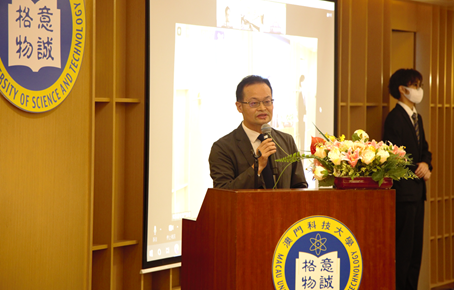On December 4, 2022, the Guangdong-Hong Kong-Macao Greater Bay Area Intellectual Property Legal Alliance held its 2022 annual conference and the 4th "Intellectual Property Macao Forum" at the R104 Conference Hall of the Macau University of Science and Technology. The forum was held online and offline.
The keynote speeches were delivered by Professor Wu Handong, a specially appointed professor at the Faculty of Law of the Macau University of Science and Technology, and Professor Yi Jiming of the Law School of Peking University. Professor Wu spoke on the topic of "Digital Economic Development and the Rule of Law Protection of Intellectual Property Rights", emphasizing the protection of patent rights for computing power algorithms and copyright protection for digital content. He also discussed issues related to data property rights and data property systems. Professor Yi gave a speech on "Intellectual Property Legislation in the Era of the Civil Code", focusing on the connection between the civil code and intellectual property law, and the construction of the "basic law + single law" system.
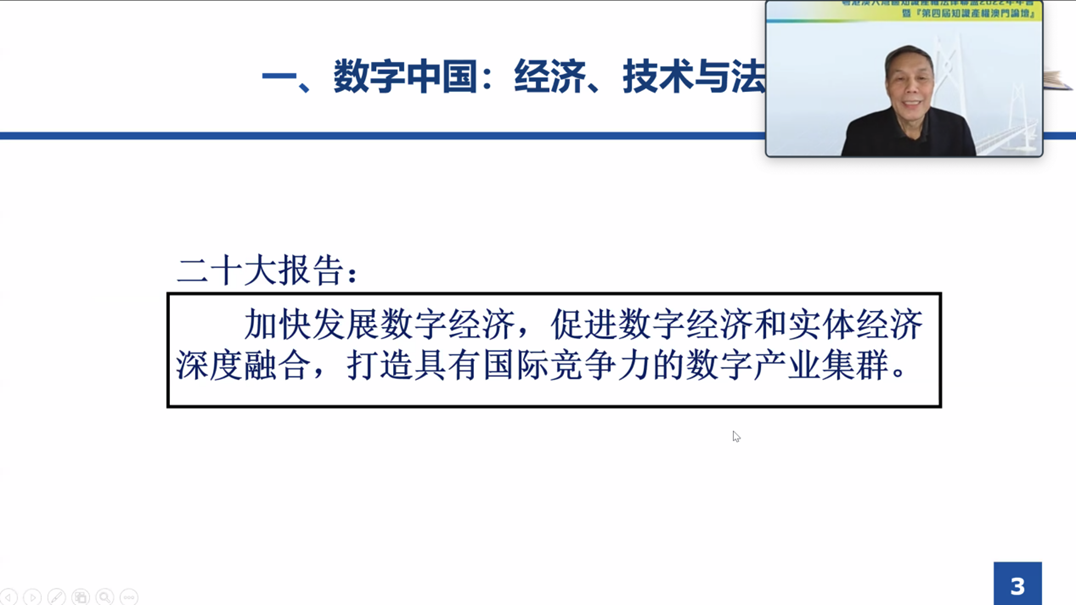
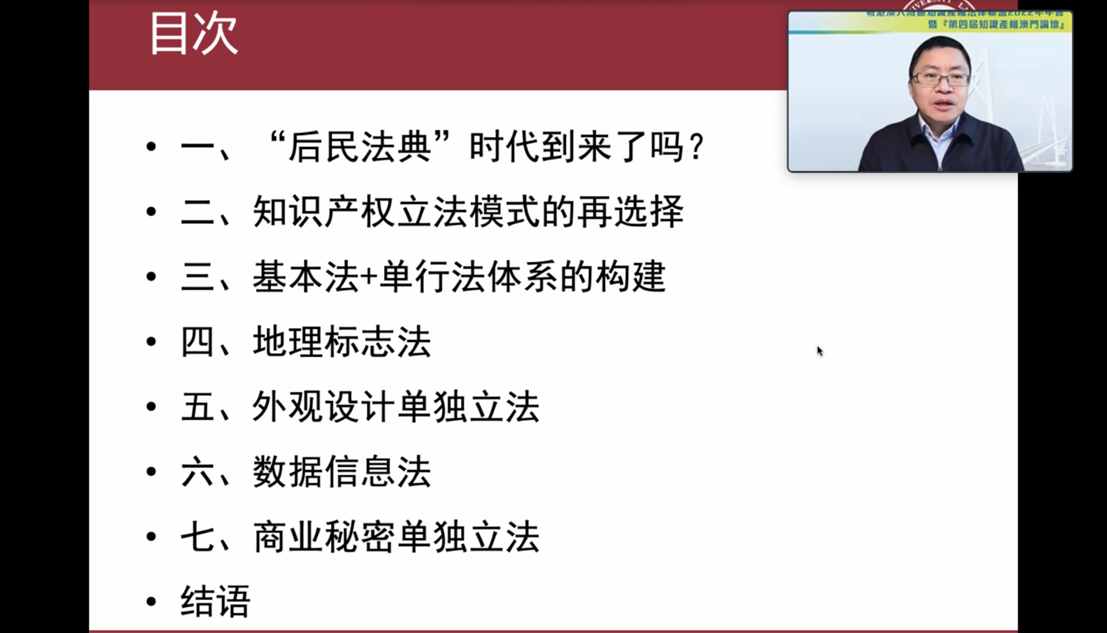
The first unit of the forum focused on "Research on the Basic Theoretical Issues of the Intellectual Property System", with Associate Professor Yi Zaicheng from the Faculty of Law of the Macau University of Science and Technology as the moderator. Professor Yu Xiang, an academician of the European Academy of Sciences, vice president of Hubei Normal University, and dean of the China-Europe Intellectual Property Research Institute of Huazhong University of Science and Technology, delivered a speech on "Challenges and Countermeasures of Artificial Intelligence on Patent Law and Copyright Law". Professor Xu Xuan, dean of the Intellectual Property Research Institute of Jinan University, gave a speech on "China-style Modernization and Intellectual Property Strong Country 2.0". Deputy Director Zhang Qiuyue of the Zhuhai Intellectual Property Protection Center spoke on "The Modernization of China's Intellectual Property Protection and Governance System from the Perspective of the Construction of the Protection Center".
Professor Huang Yaying, dean of the School of Intellectual Property at Shenzhen University, provided comments on the speeches. She emphasized the importance of keeping up with technological development in legislation and noted the advantages of the common law system. She praised the speeches of Professor Yu Xiang and Deputy Director Zhang Qiuyue for their innovative perspectives on the challenges faced by China's intellectual property protection and governance system.
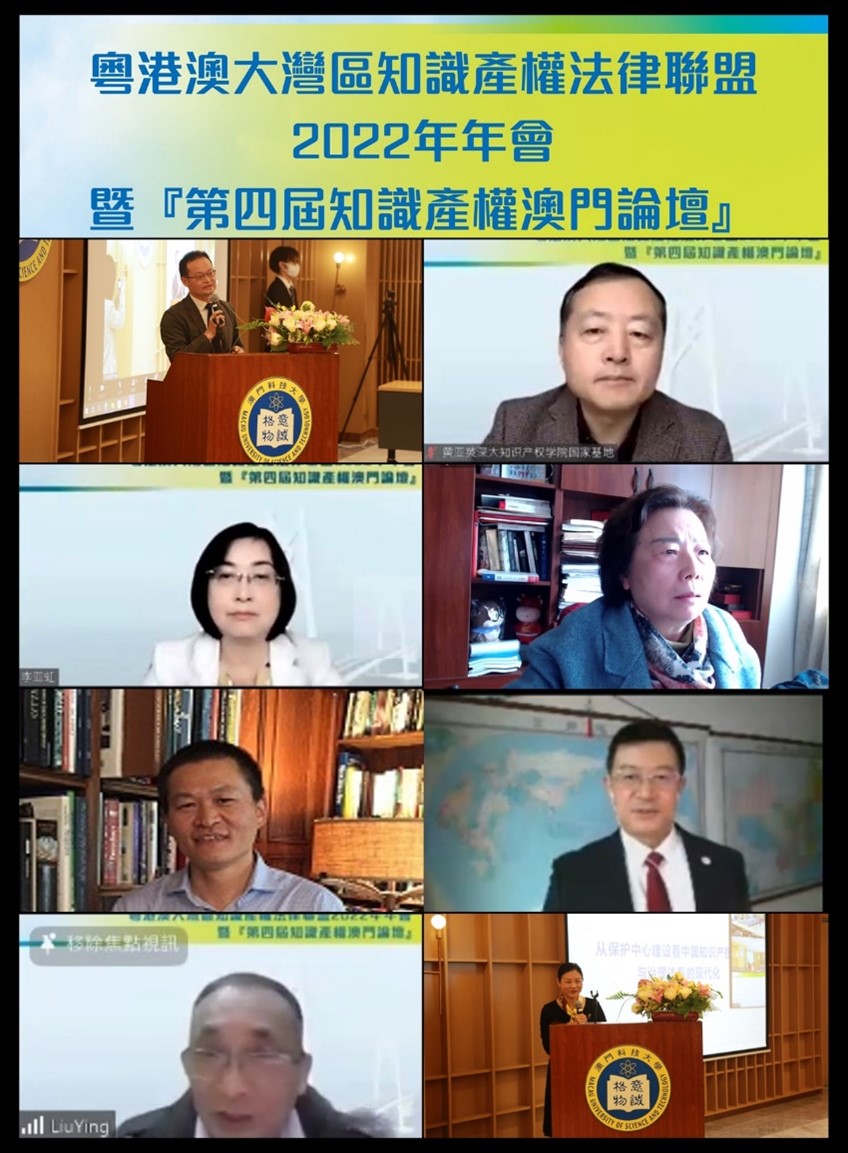
The second panel of the forum focused on "Research on Frontiers and Hot Issues of Intellectual Property". It was chaired by Dean Lu Xiaoming of the Law School of Guangdong University of Finance and Economics.
Professor Zhang Ping, Executive Director of the Guangdong-Hong Kong-Macao Greater Bay Area Institute of Intellectual Property Development at Peking University Law School, delivered a speech on "Legal Issues of Open Innovation and Intellectual Property". In his speech, he discussed the intellectual property issues and legal risks associated with open resources in an open innovation environment, and proposed to consider open hardware as a new innovation model.
Professor Xie Huijia from the Intellectual Property Department of the Law School of South China University of Technology gave a presentation on "Research on Copyright Infringement Notice Obligations of Short Video Platforms from the Perspective of Algorithm Recommendation". In his speech, he analyzed the challenges posed by algorithmic recommendation, the controversy over short and long videos, and the changing landscape of internet technology. He argued that the neutrality of short video platforms is questionable, and proposed measures to improve their copyright infringement notice obligations.
Professor Xie Lin from the Intellectual Property Law Research Institute at Sun Yat-sen University Law School delivered a speech on "Consistency in the Application of Technical Protection Measures under the New Copyright Law". She discussed the problems arising from the new definition of technical protection measures under the new Copyright Law, and proposed a comprehensive protection of technical measures from the perspective of balancing mechanisms and protection levels. She also provided suggestions for building a reasonable use and exception system for technical protection measures.
Associate Dean Liu Jiancui from the School of Intellectual Property at Shenzhen University gave a speech on "Thinking about the Problem of Indicative Trademark Use". Using a typical trademark case, he highlighted the lack of clear regulations and difficulties in legal application of indicative trademark use in China. He differentiated indicative trademark use from traditional confusion standards and summarized its constitutive elements based on legal analysis.
Director Chen Zhijie of the Future Rule of Law Research Center at Jinan University's School of Humanities delivered a speech on "Research on Composite Protection of China's Aerospace Patents in the New Era". He explained the background and significance of the topic, and emphasized the urgent need for protecting China's aerospace patents. He proposed a series of measures, including improving domestic protection systems, strengthening international patent layout, and promoting the development of the "International Convention on the Protection of Intellectual Property Rights in Outer Space".
Professor Peng Xuelong, Director of the Intellectual Property Research Center of Zhuhai Campus at Central South University of Finance and Law and the Macau Intellectual Property Center, affirmed the selection and content of the second panel topic as a reviewer. Professor Peng believed that Executive Dean Zhang Ping's keynote speech on "Legal Issues of Open Innovation and Intellectual Property" was a presentation of the content of the 20th Party Congress report on "forming a globally competitive open innovation ecosystem," exploring the effectiveness of licenses, legal issues, and anti-monopoly risks, which not only has theoretical value but also practical significance for corporate innovation. Professor Xie Huijia's focus on the "safe harbor" principle, in light of changes in user behavior and platform status, led him to suggest that the obligation of copyright infringement notices should be restructured and deserves further exploration. Regarding Professor Xie Lin's reflection on the technical protection measures selected in the new Copyright Law, Professor Peng pointed out that technical measures ultimately protect copyright and have significant research value. Professor Peng also praised Associate Dean Liu Jiancui's analysis of the rules of indicative trademark use as clear and accurate, and although there is no clear legal regulation on indicative trademark use, based on the basic principles of trademark law, resolving related issues is not an obstacle. Finally, Director Chen Zhijie's presentation on the urgency of protecting outer space, controlling international patents, and China's response strategies, was highly targeted and worthy of further research.
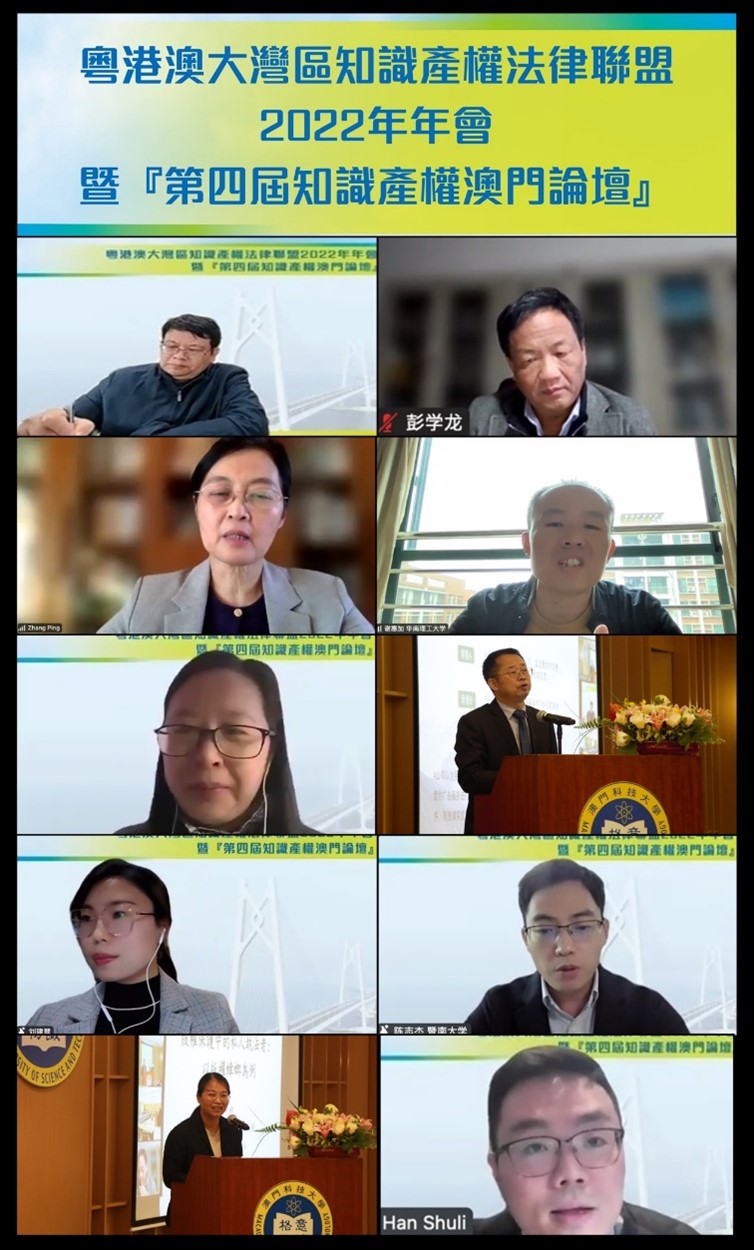
The theme of the third panel at the forum was "Theory and Practice of Intellectual Property Protection System in the Guangdong-Hong Kong-Macao Greater Bay Area," chaired by Dean Zhang Yongzhong of the Law School at South China Normal University. Vice Dean Chang Tingbin of the Guangdong International Intellectual Property Research Institute delivered a keynote speech titled "Mediation of Intellectual Property Disputes in the Guangdong-Hong Kong-Macao Greater Bay Area." In his speech, Vice Dean Chang discussed the advantages of mediating intellectual property disputes and the institutional construction of intellectual property mediation from the perspective of the Greater Bay Area. He also detailed the differences and similarities in intellectual property litigation among the three regions. Secretary-General Zhang Yalian of the Guangdong Intellectual Property Research Association delivered a keynote speech titled "Innovative Mediation Model for Intellectual Property Disputes in the Guangdong-Hong Kong-Macao Greater Bay Area Based on the Example of Joint Mediation between Hong Kong and Macao." Secretary-General Zhang used the example of joint mediation between Hong Kong and Macao to explain and analyze a case in which a German company discovered three defendants in China infringing on its intellectual property. The case was successfully mediated with the help of two mediators from Macao and Hong Kong. Secretary-General Zhang also proposed the construction of an intellectual property mediation platform for the Greater Bay Area, which would provide smart mediation services to market entities using technologies such as the internet and big data analysis. Professor Huang Yuye, Dean of the Intellectual Property School at Central South University of Finance and Law, provided commentary on the speeches delivered in this panel. Professor Huang praised the diversity and representativeness of the speakers, who explored the theme of "Theory and Practice of Intellectual Property Protection System in the Guangdong-Hong Kong-Macao Greater Bay Area" from multiple perspectives. Several speakers focused on the emerging intellectual property dispute resolution method of mediation. Professor Huang noted that Vice Dean Chang highlighted the natural advantages of intellectual property mediation in the Greater Bay Area compared to litigation and arbitration, but also pointed out its limitations and shortcomings in the specific use process, as well as the interface with litigation and arbitration dispute resolution methods and the three legal jurisdictions in the Greater Bay Area. Secretary-General Zhang provided specific and detailed information on joint mediation between Hong Kong and Macao, which he believes is an effective practice that deserves further exploration. Finally, Professor Huang addressed Lawyer Shao's proposal on copyright protection of emoji, stating that emoji should be considered a new type of work protected by copyright law, and as long as they meet the requirements for copyright protection and constitute a work, they should be protected by copyright law.
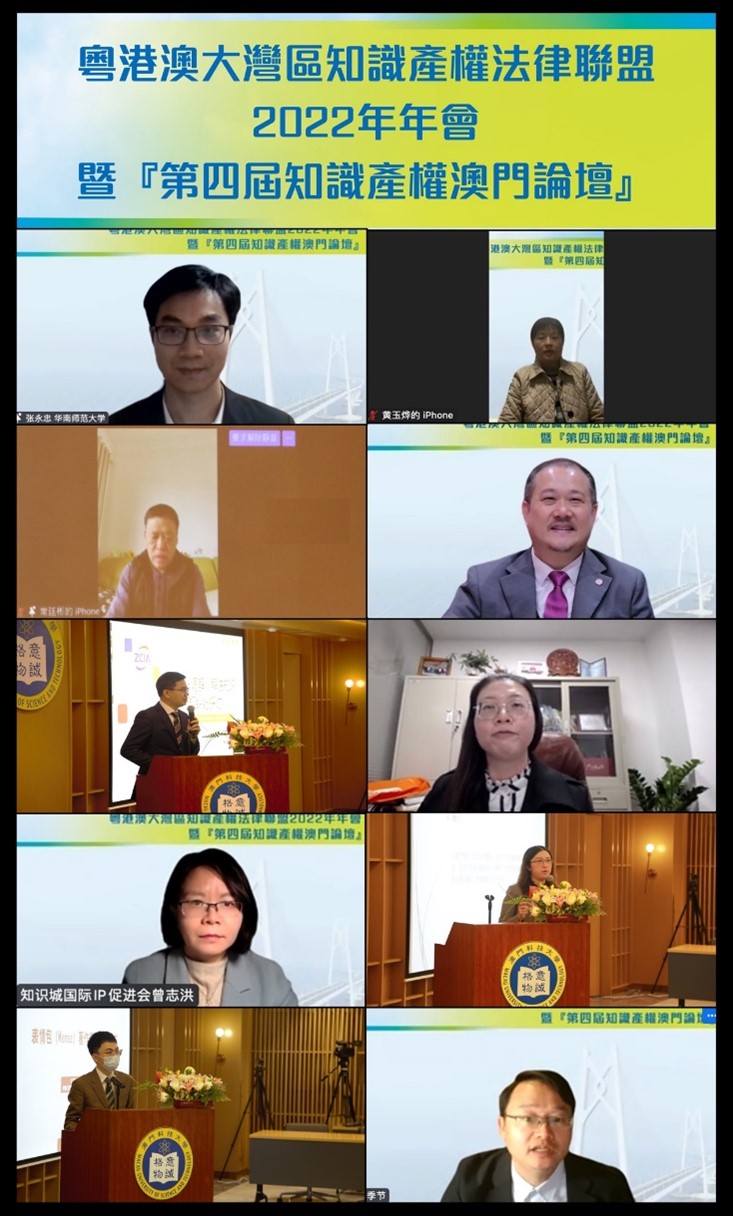
At the closing ceremony of the forum, Associate Professor Yi Zaicheng from the Faculty of Law at the Macau University of Science and Technology summarized the forum and delivered the closing speech on behalf of the alliance
